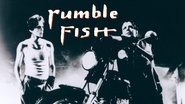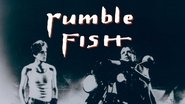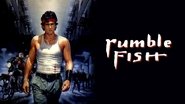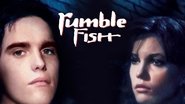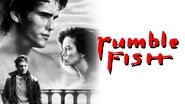oOoBarracuda
Rumble Fish is a little film talked about in Francis Ford Coppola's notable filmography, and one that everyone suffers from its lack of attention. Although a bold statement to make of the same director that The Godfather trilogy to life, a strong case can be made that Rumble Fish is Coppola's best. Rumble Fish was made in 1983, after Coppola's immensely successful Godfather parts II and III. Starring Matt Dillon and Mickey Rourke, Rumble Fish tells the story of a man who has been born in the wrong time, struggling to find his place in the world. A deeply exploratory film delving into the human conscience, Coppola proves himself, in a stunning way, beyond the mafia films he is best known for. The leader of a small gang losing its influence in an aging industrial town, Rusty James (Matt Dillon) is struggling to find an avenue for himself in life. Constantly trying to live up to the name his older drifter brother, The Motorcycle Boy (Mickey Rourke) created for himself, Rusty James seems destined to follow a meaningless path throughout his life. Rusty James' mother left her family, and his father (Dennis Hopper) became a drunk after departure. His brother constantly roamed about the world, leaving Rusty James to try to find his way in his town with little opportunity, with very few life skills. The only place Rusty James finds comfort and purpose are in the gang pursuits with his street hoodlum friends. Rusty James is met with a huge dilemma, however when it becomes glaringly obvious that the good ole' days he imagines where the street gangs ruled the neighborhoods is quickly fading into the past. There should be no question after viewing Rumble Fish that Francis Ford Coppola is one of the best auteurs of our time. Each aspect of the film comes together to make an incredible final product that will stay with the audience weeks after viewing. Shot in amazing black and white, Coppola illustrates his amazing directorial prowess. Making the decision to shoot a film about a kid who is living in the past in stunning black and white shows the genius of the filmmaker. The sounds he chooses were also incredible to the plot. The simple sounds that filled the film did well to emphasize the incredible story line as we follow Rusty James' search for meaning. The camera work in this film is the best I've seen in a long time. Coppola's use of foreground, middle ground, and background to each tell an integral part of the story was incredibly executed to bring the entire film together. I am a viewer that is sensitive to film lighting. I ascribe to the school of thought that lighting can make or break a film. The lighting in Rumble Fish takes on a character of its own, which is impressive for a black and white film. The shadows utilized in the film prove Coppola to be one of the best directors at capturing the subtleties of life and what they mean to the big picture of a film. In the striking scene in the pet store where we meet the rumble fish, we see that Spielberg was obviously influenced by Coppola, and borrowed from Rumble Fish for his Schindler's List. The beautiful ending of Rumble Fish brings to a close a brilliant period piece that doesn't try too hard, easily resulting in Coppola's best film.I can think of no ill words for Rumble Fish, and I am hard on movies as the art form that they are. Coppola truly shows his prowess as a director with this beautiful black and white, brilliantly scored film. The acting was wonderful, but you really don't notice it much because you're captivated by the film's production aspects from the very beginning. If you haven't seen Rumble Fish, do yourself a favor and watch it as soon as you can.
NateWatchesCoolMovies
Francis Ford Coppola's Rumble Fish is a gorgeous, star studded look at street hoodlums of the 1950s. It's based on the book by S.E. Hinton, who also wrote The Outsiders, which Coppola adapted as well. This one is a bit of a different animal though. Where one might expect a grounded, topical, straightforward script and narrative, we're instead treated to a lyrical, dense and very almost experimental tone. Characters exude archetypal charisma that is stunningly thrown off balance by the poetic, otherworldly dialogue that's at times almost inaccessible, but always mesmerizing. It's as if The Outsiders went to sleep and had a dream, functioning on a similar yet slightly unconscious plane. Once you get accustomed to such an aesthetic, it's a film to draw you in and give you poetic dreams of your own. A young Matt Dillon plays Rusty Ryan, a naive young upstart with dreams of notoriety in the worn doldrums of his neighbourhood. He lives under the intense reputation of his older brother, known only as The Motorcycle Boy (Mickey Rourke). Rourke is at the peak of his moody blues James Dean phase here, and commands the screen with a laid back abandon and smirking charm. He gets romantically involved with angelic local beauty Patty (young Diane Lane, stunning), and deals with his lovable deadbeat father (Dennis Hopper). The scenes between Hopper, Dillon and Rourke has an easy swing to them, and the three have a lived in dynamic that strengthens their characters, individually and as a group. Rourke is under the suspicious eye of robotic, violent local cop Patterson (William Smith), who is just waiting for him to step out of line. Dillon and his thug pals, including Nicolas Cage, Chris Penn and Vincent Spano, daydream their days away pining for the oft talked about days when gang warfare was commonplace. There's a splendid supporting cast including Laurence Fishburne, Sofia Coppola, Diana Scarwid, and Tom Waits, mumbling sweet existential nothing's to himself in the local diner. The film is shot in wistful black and whites, and exists in a realm of heightened emotions where the characters all seem to be a little larger than life, but nevertheless human. There's a surreality to it though, a free flowing, dreamy vibe of Chrome on asphalt, lazy afternoons and long glances at pretty girls in the window.
PWNYCNY
This is a message movie. Everything in this movie is meant to have deep, symbolic meaning. The problem is: trying to decipher those meanings. If a story cannot be understood, then the movie loses its value as drama. The principal character, Rusty James, is a young man trying to find himself. The setting for the story is surrealistic, which gives the movie a certain off-beat avant-garde quality. Although a wise-guy, Rusty James has certain endearing qualities, which makes him someone with whom the audience can empathize. The movie is about consciousness-raising. When his older brother, played by Mickey O'Rourke, enters the story, Rusty James is forced is deal with the emptiness of his life. To find out how he deals with that revelation, watch the movie.
vailsy
I watched this movie a long time ago and remember not being terribly impressed from an action standpoint, but re-watching it now I was able to appreciate the artistic side of it more especially in the sound design Mickey Rourke (who looks pretty amazing in this movie and very un-eighties) is colour blind and partially deaf and so the movie is in black and white and has a sound which is artificially reverberant and surreal. There is very little production sound present and the soundtrack has more or less been completely done from scratch like would be expected in an animated movie for example. It's really quite sparse and the results are extremely interesting. The music is also very unusual in a good way, and it's difficult to date the film from the soundtrack Because of the way the movie was made it avoids many of the clichés present in most 80's films and has largely aged really wellWell worth a watch






